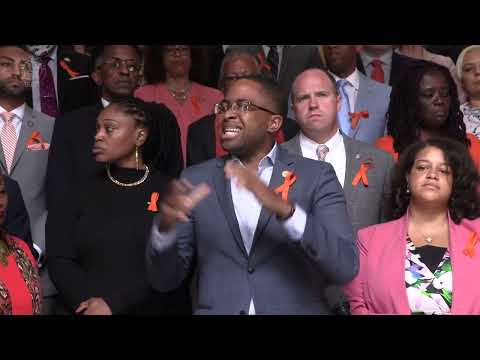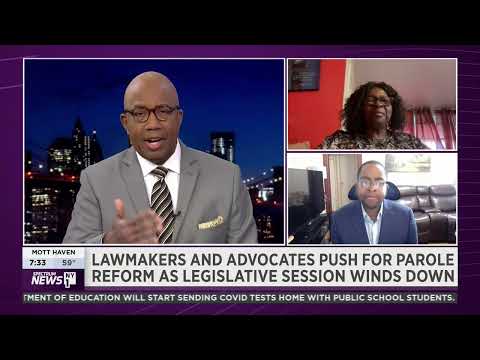
“Justice For Incarcerated People in New York is Overdue” — NY Senator Myrie and Assemblymember Perry Announce Introduction of the “Prison Minimum Wage Act”
Jonathan Timm, Director of Communications
February 6, 2019

FOR IMMEDIATE RELEASE: February 6th, 2019
Contact: Jonathan Timm (Myrie), SenatorMyrieComms@gmail.com, 313-618-7005
“JUSTICE FOR INCARCERATED PEOPLE IN NEW YORK IS OVERDUE” —NY SENATOR MYRIE AND ASSEMBLYMEMBER PERRY ANNOUNCE INTRODUCTION OF THE “PRISON MINIMUM WAGE ACT”
Myrie, Perry, and a host of lawmakers, labor unions, and advocates call for dramatic wage increase for incarcerated workers, called for continued action on criminal justice reform
Brooklyn, NY—On Wednesday, February 6, New York State Senator Zellnor Myrie, Chair of the Senate Elections Committee, Assemblymember Nick Perry announced their plans to carry the “Prison Minimum Wage” act in both houses of the New York legislature (A1275/S3138), which would raise the Prison Minimum Wage to $3.00 per hour.
Myrie and Perry were joined by Senate cosponsors of the bill Senator Alessandra Biaggi of the Bronx and Senator Jessica Ramos of Queens.
Along with other lawmakers, advocacy groups, and unions, Myrie and Perry were joined by Lymus Rivera, Group Facilitator at The Fortune Society who worked while serving a sentence at a New York State prison. Rivera earned a maximum of $0.16 per hour while incarcerated.
The bill would mark the first raise for incarcerated people since 1993. People who labor in New York prisons earn as little as $0.10 to $0.65 per hour, yet incarcerated people in state prisons have to pay for phone calls, stamps, and other necessities that are essential to maintaining a connection with their family and increasing their quality of life.
Senator Myrie (D-Brooklyn) said: “Incarcerated people are human beings. They deserve to be treated with dignity and to share in the fruits of their labor. The fact that New York’s incarcerated people contribute tens of millions of dollars in revenue to the state and haven’t gotten a pay increase in more than a quarter century is unacceptable, and this legislation will change that. Justice for incarcerated people in New York is overdue.”
Assemblymember Nick Perry (D-Brooklyn) said: “New York must lock up and throw away the key on the exploitive practice of condoning prison slave labor and restore the human dignity of men and women serving time in our prison system. Their labor powers an industry in our state which generates upwards of $50 million, but the indignity, and immorality of our continuous violation of the human rights of these persons in our prisons is debasing to us as a great state and nation that respects and values humanity.”
Senator Alessandra Biaggi (D-Bronx/Westchester) said: "There is no reason to treat people in prison as less than human. Most of them are going to leave prison and return to society, and our goal should be to prepare them to be able to build new lives. When you treat people with respect, you help to build their self-respect. Paying prisoners enough to be able to gain some benefit from the work they do is sensible and humane."
Senator Jessica Ramos (D-Queens) said: “The Prison Minimum Wage Act will allow incarcerated people to provide for themselves while they serve their time and help them succeed after they’ve served their time. I am proud to stand with Senator Zellnor Myrie in doing the right thing and co-sponsoring this bill to raise the minimum wage for incarcerated people, and I will continue to work with Senator Myrie and my colleagues to improve living conditions for incarcerated people."
JoAnne Page, President and CEO of The Fortune Society said: “The Fortune Society has advocated for equitable treatment for people with justice histories for over fifty years. Through this legislation, non-profits can work with a myriad of people equipped with valuable skills, and people incarcerated will meet prospective employers, gain work experience, and feel less isolated. We applaud Senator Myrie and Assemblymember Perry for sponsoring this legislation, which also takes a critical step forward raising the hourly amount earned towards a fairer wage.”
Erika Lorshbough, Asst. Dir. for Legislative Affairs for the New York Civil Liberties Union (NYCLU) said: “Fairer compensation acknowledges the dignity and value of the work of incarcerated people, and is a critical step toward realizing the promise of the 13th Amendment. No New Yorker should go without adequate compensation for their labor simply because they are involved in the criminal justice system. With this legislation, Assemblymember Perry, Senator Myrie, and their cosponsors are showing New York’s commitment to addressing the real-life consequences of mass incarceration head-on, even as Washington pushes a regressive law-and-order agenda.”
City Council Member Menchaca (D-Brooklyn) said: “We are using the labor of people who are incarcerated for a whole host of manufactured goods, including every license plate in New York. To reap these benefits but not pay sufficient compensation is to treat these human beings as though they were slaves or indentured servants. That is a punishment that fits no crime. We must update our minimum wage laws for those who labor while incarcerated, lest we extend into modern times one of the worst injustices this country has ever perpetuated.”
BACKGROUND ON THE BILL:
On what the bill does:
- The bill would raise the minimum wage for incarcerated people who work to $3.00 per hour, bringing the prison minimum wage in line with four other states: Nevada, Alaska, Maine, and Kansas.
- This would be a dramatic increase in pay for Incarcerated people in New York, who currently make between $0.10 and $1.14 per hour for work ranging from cleaning and maintenance to manufacturing goods.
On prison labor in New York State:
- The majority of people confined in NY State prisons are required to work six hours per day, five days per week.
- Incarcerated people in the state have not had a raise since 1993.
- Many prisons require incarcerated people to pay for phone calls, stamps, and other means of communicating that are crucial for maintaining a connection with their family on the outside. They also pay for various goods of their choice at their prisons’ commissaries.
- Incarcerated people have been reportedly forced to work and punished for not working, leading many advocates to call prison labor “modern slavery.” Incarcerated people do not have the right to form unions, they are not protected by federal or state minimum wage laws, and they are not eligible to receive workers compensation if they are injured on the job.
- Workers in New York prisons manufacture a wide range of goods that are provided to municipal and state agencies — including desks, trash cans, furniture, textiles, and more — all for “Corcraft,” which is the brand name for the state-run Division of Correctional Industries. Every license plate in New York is manufactured by incarcerated people working for Corcraft.
###
related legislation
Share this Article or Press Release
Newsroom
Go to NewsroomSenator Myrie 2022 Veteran Hall of Fame
May 30, 2022

Myrie Responds to Buffalo Shooting
May 16, 2022

